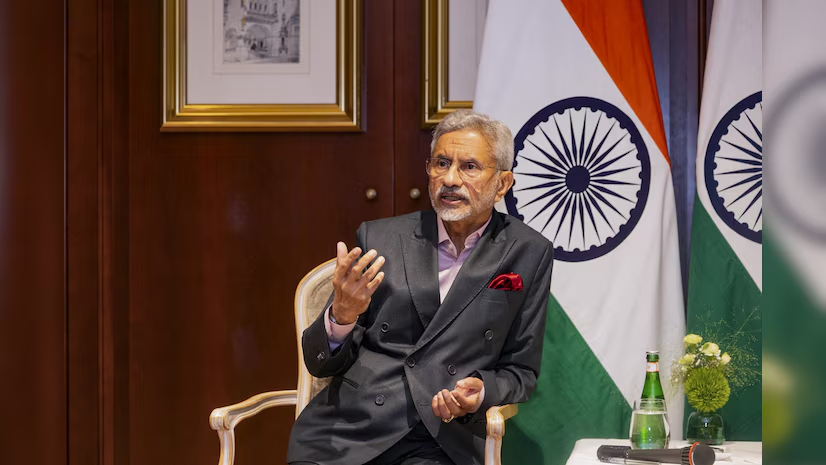S. Jaishankar on India’s Neighbourhood Policy: Managing Expectations in an Unpredictable Region
- MGMMTeam

- Jun 22, 2025
- 4 min read
External Affairs Minister S. Jaishankar has offered a candid assessment of India’s diplomatic posture in its immediate neighbourhood, emphasizing the complexity of maintaining harmonious ties with bordering nations. In his remarks during a DD India discussion, he acknowledged that India's relationships in South Asia are not always linear or peaceful, but underscored the long-term strategy of building frameworks rooted in shared interests and regional responsibility.
Cooperation with India Comes with Benefits, Says Jaishankar
Jaishankar laid out a foundational premise that underpins India's neighbourhood policy: cooperation with India is mutually beneficial, while distancing from it carries inherent costs. This principle, he noted, holds true for almost every neighbouring nation except Pakistan. The exception, he explained, lies in Pakistan’s national identity being shaped largely by its military establishment, which promotes entrenched hostility towards India.

By framing diplomacy in terms of tangible benefits and consequences, the External Affairs Minister hinted at a shift away from the traditional sentiment-driven foreign policy of the past. Instead, India is increasingly relying on realpolitik, where strategic partnerships are built around aligned interests rather than historical or ideological commonalities.
Beyond the Neighbourhood: Expanding Strategic Horizons
In recent years, India has actively diversified its diplomatic engagements, extending its focus well beyond its South Asian backyard. Jaishankar attributed this strategic expansion to Prime Minister Narendra Modi’s foreign policy vision, which emphasizes deeper ties with the Gulf nations, ASEAN countries, and key players in the Indo-Pacific.
While addressing concerns over global uncertainty, Jaishankar admitted that relationships with powers such as the United States can often be unpredictable. Therefore, India’s response has been to cultivate multiple poles of partnership, ensuring that its foreign relations are not overly dependent on any single country. This multi-vector diplomacy, he asserted, is vital for preserving autonomy in decision-making and adapting to shifting global dynamics.
China: Preparedness Over Passivity
The conversation inevitably turned to India’s contentious relationship with China. Jaishankar made it clear that India is no longer adopting a passive approach to border issues. Over the past decade, India has significantly upgraded infrastructure along the Line of Actual Control (LAC) in order to counter Chinese assertiveness. Unlike earlier decades when border preparedness was neglected, India now insists on defending its sovereignty with strength and strategy.
This transformation is not merely physical but philosophical. It reflects India's broader assertion of its place in the international system—a country that expects peaceful coexistence but is fully prepared for conflict, if necessary.
Neighbourhood Volatility: Stability Through Systems
Jaishankar acknowledged that regime changes and political instability are common across South Asian countries. However, he stressed that India’s aim is to embed a sense of continuity and collective interest into its bilateral ties, ensuring that a change in leadership does not necessarily mean a rupture in relations.
He pointed to improved relations with Sri Lanka and recent diplomatic normalization with the Maldives as evidence of India’s steady hand. Regarding Nepal, he conceded that India often gets drawn into its internal political dynamics, but he advised patience and sustained engagement to manage such challenges. For India, strategic consistency—rather than short-term appeasement—is key to long-lasting influence.
Rewriting the Terrorism Playbook
Jaishankar also discussed India’s recalibrated approach to terrorism, especially in relation to Pakistan. The 2008 Mumbai terror attacks, he said, were a turning point. They triggered a shift in national sentiment and diplomatic doctrine. India now follows what he termed a “new normal,” where terror attacks invite consequences not just for the perpetrators but also for the state actors who enable or shelter them.
This doctrine has guided India's toughened stance—be it through cross-border strikes, intelligence sharing with allies, or the revocation of Article 370 in Jammu and Kashmir. These moves are not isolated events, but rather part of a comprehensive security framework built on deterrence, readiness, and international collaboration.
India’s Global Posture: The Modi Factor
Jaishankar credited Prime Minister Modiji’s leadership with transforming India into a more assertive and self-confident player on the world stage. Whether it’s humanitarian rescue operations such as Operation Ganga in Ukraine or Operation Sindhu in West Asia, India is increasingly seen as a nation capable of projecting influence and taking responsibility beyond its borders.
He emphasized that the world now sees India not just as a regional power, but as a country willing to shoulder global responsibilities—be it in terms of climate diplomacy, disaster relief, or counter-terrorism cooperation.
Conclusion: Between Principles and Pragmatism
India’s neighbourhood policy today is a delicate balance between principles and pragmatism. While New Delhi continues to champion shared growth and regional stability, it is no longer shy about asserting its core interests. From countering China's aggressive posturing to diplomatically isolating Pakistan on terrorism, India has made it clear that it will pursue peace—but not at the cost of preparedness or pride.
S. Jaishankar’s remarks serve as both a reflection of India’s evolving diplomatic identity and a roadmap for how the country plans to navigate an increasingly volatile world. With a more assertive foreign policy doctrine, India is moving from reactive to proactive diplomacy, seeking not just to adapt to its neighbourhood but to help shape it.
(Sources: NDTV, Business Standard)




Comments